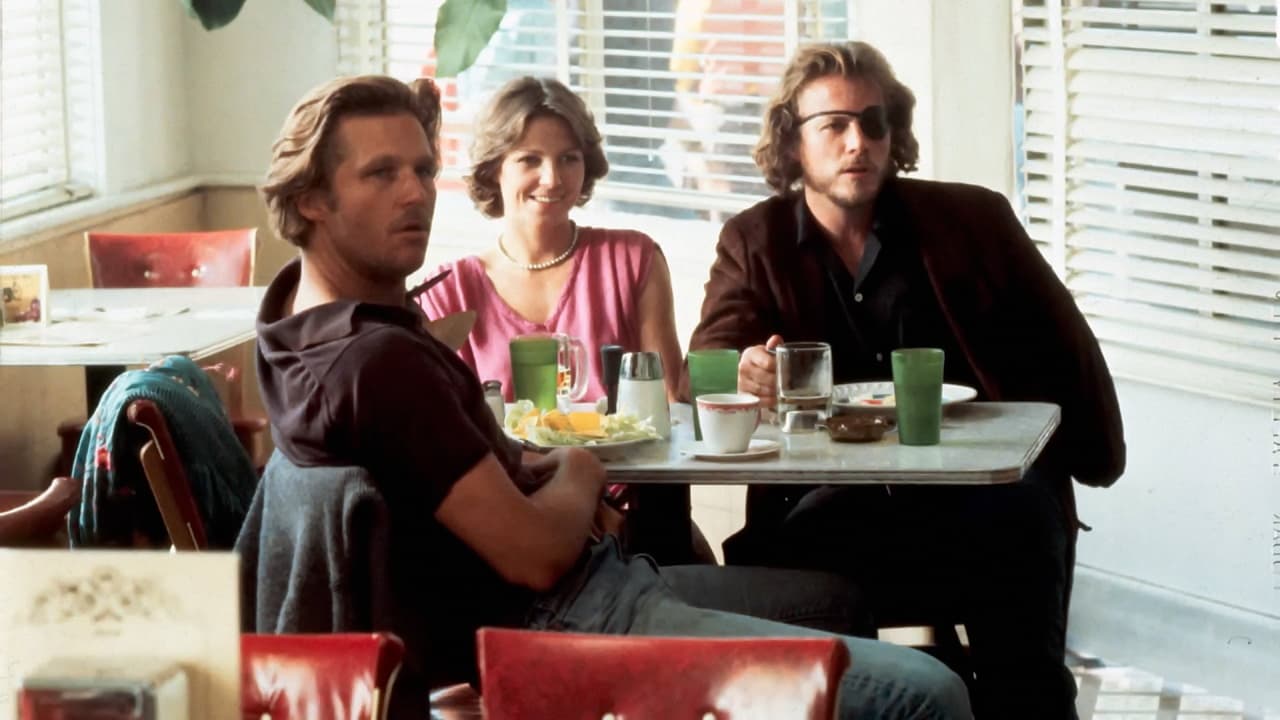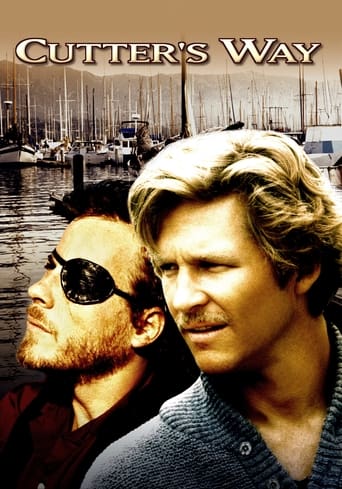Reptileenbu
Did you people see the same film I saw?
2freensel
I saw this movie before reading any reviews, and I thought it was very funny. I was very surprised to see the overwhelmingly negative reviews this film received from critics.
Ogosmith
Each character in this movie — down to the smallest one — is an individual rather than a type, prone to spontaneous changes of mood and sometimes amusing outbursts of pettiness or ill humor.
Sameer Callahan
It really made me laugh, but for some moments I was tearing up because I could relate so much.
Predrag
Brilliant allegorical film about wealth, power, and commitment in America. Judging from other reviews, the film does not appeal to everyone. That's understandable. The characters are almost uniformly dislikable, from the abusive Rich (John Heard), to the egotistical Alex (Jeff Bridges), to the self-pitying Mo (Lisa Eichorn), to the slimy George (Arthur Rosenburg) there is no one left to root for. At least not until later when the two crippled halves of Bridges and Heard finally unite, figuratively and literally, into one potent whole. Then we realize that it's toward this completion that the twists and turns of the movie have been moving all along. (I think this also explains why the Ann Dusenberry character drops out at a critical stage. She is no longer needed to get the two together.) Rarely has any film dared to create such an unsympathetic cast of personalities, especially Heard's Richard Cutter. If he has a single redeeming quality, I can't find it. His loud, grating voice annoys, piling on one sarcasm after another, oblivious to the hurt he causes. Like Mo he wallows in self-pity, and even shamelessly exploits his disability. Then too, his pursuit of the god-like J. J. Cord should appear noble, yet seems more the result of paranoid rage than a desire for justice. In fact, Heard's explosion of anger on the Santa Monica pier is among the scariest, most convincing expressions of pent-up emotion that I've seen in many years of movie watching.The three lead performances are outstanding, and in particular those of the raging and damaged Vietnam veteran played by John Heard and the desperately sad, poignantly tragic, and utterly convincing Mo (his long-suffering wife) played by Lisa Eichhorn. Watching her melts the heart, brings tears to the eyes and makes you think of those times in life when you've felt raw pain, loss, emptiness, or struggled vainly in search of purpose or meaning. The tone is dark and moody, enhanced by the memorable and haunting zither music. There's anger, resentment and paranoia after the scars left by the Vietnam War and Watergate affair. The veteran charges in single-minded pursuit of evil and representatives of those he feels have ruined his life, whilst affluent America carries on regardless, and largely doesn't care.Overall rating: 8 out of 10.
Mr-Fusion
The brilliance of "Cutter's Way" is that it keeps you thinking about the witnessed crime in the film's opening, but it's really about the three main characters; individuals so adrift and hurting that you just hope for some kind of catharsis for these people. John Heard and Lisa Eichhorn really shine because of this, although Jeff Bridges is no lightweight. This is a crime/character drama that I couldn't peel away from. You get the unshakable feeling that everything about the picture Heard's character has painted for us is wrong, and that we're heading for a very tragic ending. But it speaks to the narrative's strength that I had to find out, one way or the other. And it is most certainly a sad end (ambiguities and all), which continues to haunt after the credits finished rolling. Outstanding movie.8.5/10
Lazyl
Did the other reviewers see the same movie? We watched this, remembering it's reputation from the 80s as a good movie. Instead, we got bad American fake noir with a meandering script, one-dimensional characters, and poor Jeff Bridges wandering around looking for a decent scene where he can keep his shirt on. We stopped caring about halfway through, but decided to wait for the prescribed "cat and mouse" game of the CD jacket. Sorry, missed the mouse as well as the cat -- just a couple of weasels running around trying to find justice instead of taking whatever evidence they had to the D.A. like big boys. CW has not aged well -- drunken wife-beaters with drunken wives are no longer considered pathos, just pathetic. Hangers-on who can't make a decision and sleep with their best friend's wives: dopes. Rich guys who are "responsible" for the ills of the world? Sorry -- watch "Chinatown."Best part was recognizing Will Roger's Sunset Boulevard ranch and stable in the final scenes and during the polo match. Otherwise, a waste of time.
dr_alexander_reynolds
I admit I am also very puzzled by the huge predominance of positive reviews given to this movie on this site. The only possible explanation I can see for this is a sort of "virtue by association", since certain features of the film (the presence of actors like Bridges, Heard and Eichhorn; the setting in a seedy milieu with the Vietnam War and Watergate lurking vaguely but potently in the spiritual background) do draw it, superficially, into proximity with masterpieces of 70s cinema like certain films by Bob Rafelson or Arthur Penn. But the proximity is indeed superficial and misleading. "Cutters Way" displays certain stylistic and thematic points in common with the profound, structured, satisfying masterpieces of 70s cinema - but the sad fact is that it is itself neither profound, nor structured, nor - for just these reasons - in the least bit satisfying as a film. We are - or should be - all aware of the dangers of praising "ambiguity" as a meritorious quality in a work of art. I'm sorry, but I'm just not convinced by the implied contention - and in most of the reviews here this contention is indeed only IMPLIED, not frankly asserted and argued for - that Passer somehow made a conscious artistic decision to break with conventional structures of plot and narrative here. The fact that we are left, in the end, radically uncertain whether the man Bridges and Heard are pursuing - and whom Bridges presumably actually kills - committed the crime or not cannot seriously be presented as a dramaturgical or moral strength of the film. The vague piece of empty existentialist piety that some of the reviewers come out with - "the film is not about the need to do any particular thing but rather the need to TAKE ACTION per se" - is one of the most repellently ridiculous things I have ever heard. Does this film seriously propose to us that, since society is vaguely rotten and the true "culprits" of this rotten-ness cannot be reached or even clearly identified, we are morally required to break into the houses of random rich people, who look suspiciously content and well-situated, and murder them? I think we do the director a favour if we choose to classify the utter inconclusiveness of the final scenes as an example of the same narrative confusion and sloppiness as, say, the unexplained vanishing, two-thirds of the way through the movie, of an apparently central character: the victim's sister. I honestly don't see how anyone can fail to get the impression that - far from conveying some deep "symbolic meaning" - the final sequences of the movie were just cobbled together in an attempt to close with as many dramatic and emotional images as possible. Certainly, any psychological coherence that the Cutter character might at some point have had is jettisoned in the last five minutes. After being portrayed for an hour and a half as being doggedly and single-mindedly determined to carefully coordinate the exposure of the Cobb character as a murderer, Cutter's "plan" to do so turns out in the end to consist in nothing more than to go hobbling wildly around the man's house, run away from his bodyguards, jump on a horse he finds in his stables, and then fling himself randomly through some French windows, promptly breaking his own neck. I have no idea whether this scene was present in the original novel, but I must honestly say that this risible spectacle of the hero careening wildly through the garden party - emotionally "beefed up" by some cheap and predictable "subjective camera" shots intended to positively FORCE the viewer to identify with Cutter in a way that his actions themselves make it pretty much impossible to do - seems to me a textbook example of directorial desperation and the frantic attempt to give direction and conclusion, by the sheer illusory spectacle of velocity, to a film that really wasn't going anywhere at all. Sorry, but to even vaguely imply that a messy, confusedly pretentious movie like this can be mentioned in the same breath with 70s classics like "The King of Marvin Gardens" or "Night Moves" is to do grave disservice to the memory of 1970s US cinema.

